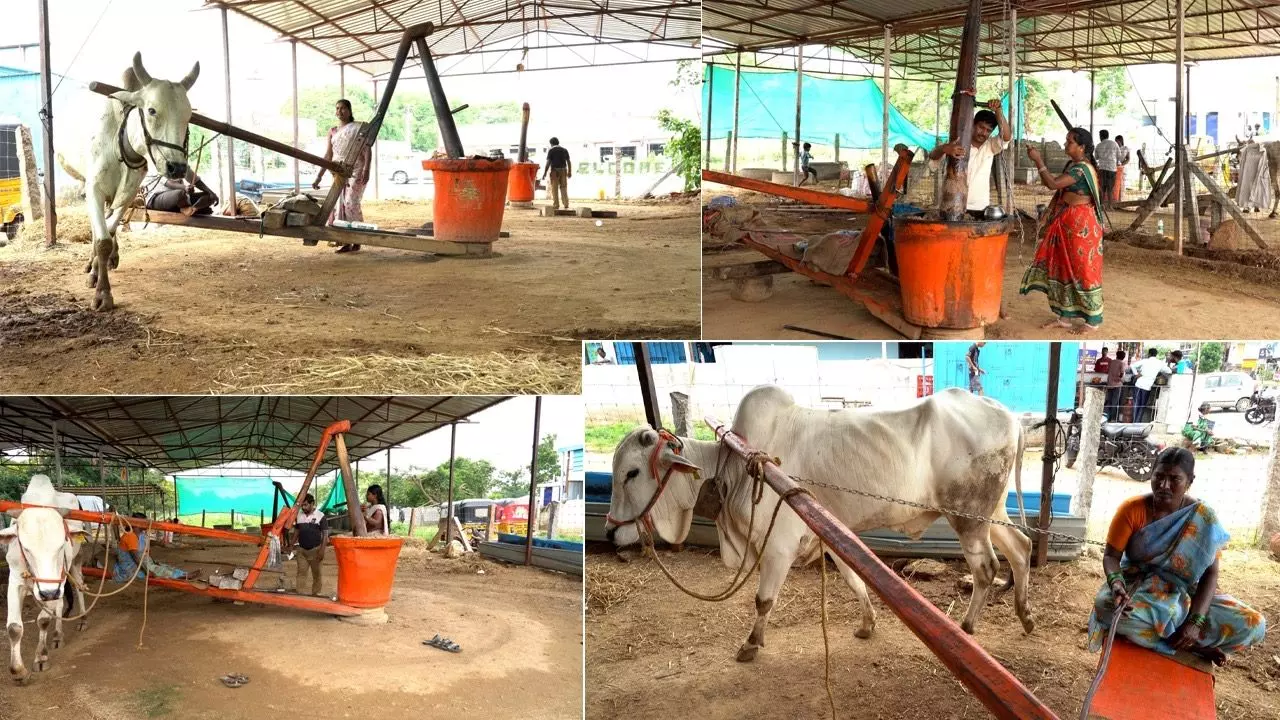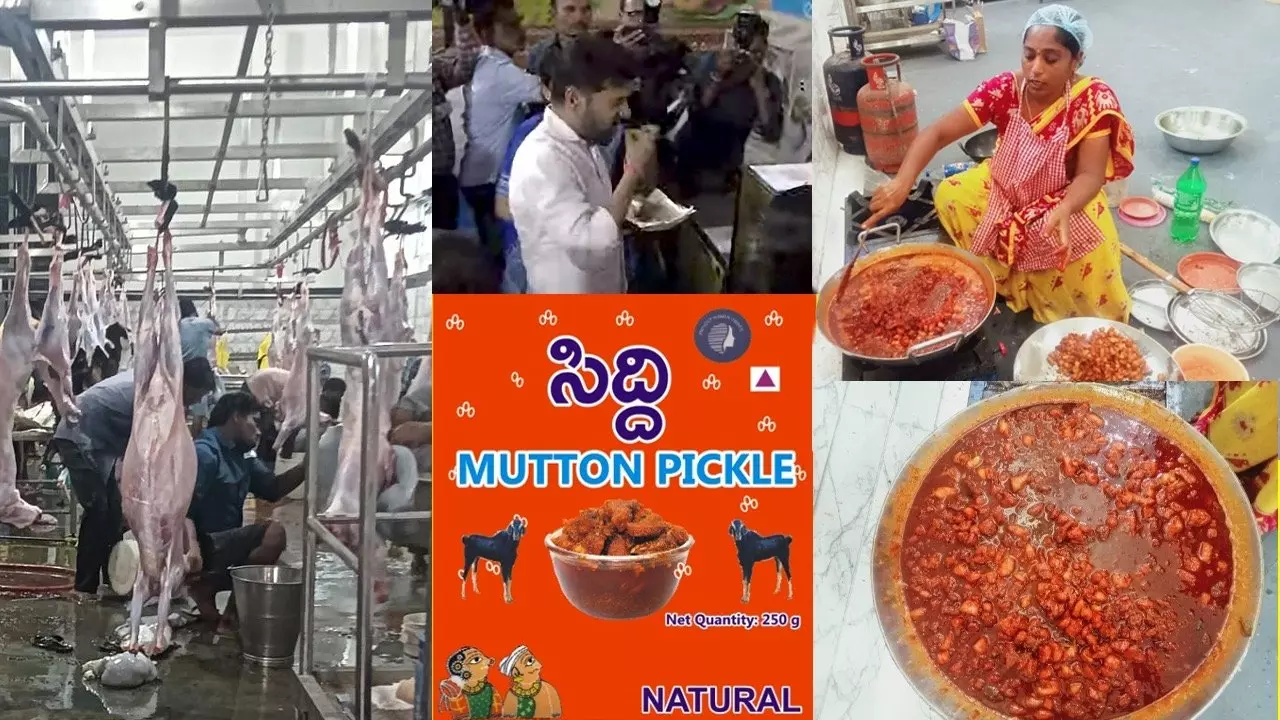
- Home
- India
- World
- Premium
- THE FEDERAL SPECIAL
- Analysis
- States
- Perspective
- Videos
- Sports
- Education
- Entertainment
- Elections
- Features
- Health
- Business
- Series
- In memoriam: Sheikh Mujibur Rahman
- Bishnoi's Men
- NEET TANGLE
- Economy Series
- Earth Day
- Kashmir’s Frozen Turbulence
- India@75
- The legend of Ramjanmabhoomi
- Liberalisation@30
- How to tame a dragon
- Celebrating biodiversity
- Farm Matters
- 50 days of solitude
- Bringing Migrants Home
- Budget 2020
- Jharkhand Votes
- The Federal Investigates
- The Federal Impact
- Vanishing Sand
- Gandhi @ 150
- Andhra Today
- Field report
- Operation Gulmarg
- Pandemic @1 Mn in India
- The Federal Year-End
- The Zero Year
- Science
- Brand studio
- Newsletter
- Elections 2024
- Events
How women from Telangana’s Irkode village built a global meat pickle brand
In Irkode near Siddipet town, a self-help group of women turned Telangana’s love for non-veg pickles into a booming business, scaling from Rs 2 lakh to Rs 20 lakh; it’s reaching homes across India and abroad

Until recently, most people hadn’t heard of Irkode, a small village located 110 km from Hyderabad, with a population of just 2,500 (2011 census: 1,227 women and 1,183 men). Just 10 km from Siddipet town, this little-known village is now making waves far beyond Telangana — even crossing state and national borders. The reason? A remarkable collective effort by 650 women to lift...
Until recently, most people hadn’t heard of Irkode, a small village located 110 km from Hyderabad, with a population of just 2,500 (2011 census: 1,227 women and 1,183 men). Just 10 km from Siddipet town, this little-known village is now making waves far beyond Telangana — even crossing state and national borders. The reason? A remarkable collective effort by 650 women to lift themselves out of poverty through entrepreneurship.
They launched a small venture rooted in Telangana’s unique food culture, specifically, its deep love for meat. The idea blossomed into a booming business: the Siddipet Non-Veg Pickles brand. Today, their pickles are sold not just across Siddipet but in other districts, states, and even countries.
The transformation began when the women, seeking to escape poverty, were brought together under a Self Help Group (SHG) initiative. The government-run Society for Elimination of Rural Poverty (SERP) played a crucial role in organising them.
Also read: How Bengaluru’s garbage is ruining lives of villagers in Karnataka’s Doddaballapur
There was a time when people from other districts were hesitant to marry their daughters into Siddipet or its surrounding areas. The region suffered from such extreme drought that even drinking water was scarce. Girls in villages had to walk miles carrying pots to fetch water from wells. Without irrigation water, farmers struggled immensely. During summers, due to the lack of fodder, livestock suffered and perished, leaving farmers in tears.
There was neither enough fodder nor drinking water for the animals. In such times, fodder had to be brought in from other states and distributed freely to farmers. For women, after their daily wage agricultural work, the only alternate livelihood was rolling bidis (hand-rolled cigarettes). But this didn’t pay well; working 12 to 14 hours a day still wouldn’t fetch even Rs 100.
After the state of Telangana was formed, focused efforts were made to develop the Siddipet region. Development began to pick up in the area. In this context, Siddipet MLA and former Minister Harish Rao began to think about providing better livelihood options for women. With his intervention, Society for Elimination of Rural Poverty (SERP) began exploring employment opportunities for these women.
During this search, it was discovered that the ICAR-NCRM (National Centre for Research on Meat) agri-food programmes could benefit the local women. Siddipet was turned into a kind of experimental lab for holistic development. This is how rural women of Irkode found a new path. A federation of nine women was formed, called the Irkode Mahila Samakhya (Irkode Women’s Federation).
“This is a major transformation,” said local journalist Sajid Pasha. “Earlier, no such programme existed. But with the formation of the federation and support from SERP, banks came forward to give loans to empower these women. With an initial loan of Rs 20 lakh, the women began a pickle business. Backed by ICAR-NCRM, the ‘Siddhi’ brand of pickles took shape.”

One standout feature is their use of traditional bullock-pressed oil (ghanuga oil) in both veg and non-veg pickles
Local activist Sai Prem Samala added, “With water from the Mallannasagar and Kaleshwaram projects, the surroundings of Siddipet have turned lush green. Women have moved beyond just kitchen roles, earning income through new kinds of work. They formed groups, the government supported them with loans, and they began producing pickles. Because of high market demand, their incomes have increased.”
With support from Harish Rao, the group was connected to the ICAR-National Research Centre on Meat, which trained them in hygienic and healthy meat preparation methods. A local food survey helped identify regional demand: the area, like the rest of Telangana, had a strong preference for meat and a growing desire for variety. This led to the idea of non-veg pickles.
Under the banner Siddhi, the brand created by the Irkode Women’s Federation, they began producing a wide range of meat pickles, including chicken, mutton, fish, and prawns. Their spicy, aromatic, and flavourful pickles quickly gained popularity, earning a reputation in both Indian and overseas markets.
Starting with just Rs 2 lakh in capital, they have since scaled up to Rs 20 lakh. They’ve even launched a ‘Meat on Wheels’ door-delivery service to nearby villages. Last year alone, the group earned more than Rs 20 lakh in revenue, according to Chandana, one of the key members. She and Latha are now financially stable and expanding the venture further.
One standout feature is their use of traditional bullock-pressed oil (ghanuga oil) in both veg and non-veg pickles. “You get only one kilo of oil for every three kilos of peanuts in the press,” says Madhusudhan Reddy, who runs the ghanuga. Uniquely, even this oil-extraction work is done by women.

While typical Andhra-Telangana pickles feature mango, sorrel leaves (gongura), and cucumber, Irkode’s specialty lies in non-veg varieties: chicken, mutton, fish, prawns
While typical Andhra-Telangana pickles feature mango, sorrel leaves (gongura), and cucumber, Irkode’s specialty lies in non-veg varieties: chicken, mutton, fish, prawns — sold at premium prices: Veg pickle: Rs 400/kg; Chicken: Rs 1,200/kg; Mutton: Rs 1,600/kg; Fish: Rs 2,000/kg; and Prawns: Rs 2,500/kg. “Chicken pickles are in particularly high demand,” says Mandadi Chandana.
Pickle-making has now become a major industry in and around Siddipet. Apart from Telangana, the products are exported to Andhra Pradesh, Tamil Nadu, Karnataka, Maharashtra, and even internationally to USA, Canada, Australia, UK, and Gulf countries. Demand is especially high in areas with large Telugu communities such as New Jersey, Texas, Toronto, and Sydney.
“Our pickles are organic. That’s what makes them so tasty,” says Chandana of the Irkode Women’s Federation. Siddipet Urban Development Authority Chairman Mareddy Ravinder Reddy underlines the importance of collective effort for women’s empowerment. Under the “Mera Gaanv Mera Gaurav” program, 25 women were given special training by scientists from the National Research Centre on Meat. The government provided space in the local slaughterhouse to produce pickles.
Also read: Pulicat women bottle palm nectar, revive Tamil Nadu’s neglected palmyra trees
Now, these women use the ‘Meat on Wheels’ mobile van to sell their products, earning significant profits. On International Women’s Day, Telangana CM Revanth Reddy visited their stall at Hyderabad Parade Grounds, tasted their ragi laddoos, and praised their work. “We wanted to turn our village’s women into entrepreneurs — and they’ve gained international recognition,” said Mareddy Ravinder Reddy.
Pickles are more than just a meal accompaniment; they reflect culture and local identity. Today, Siddipet stands tall as Telangana’s pickle capital. Packaged under the Siddhi brand, the pickles are sold in small portions and shipped globally via courier partnerships. From humble beginnings to global exports, these rural women have turned pickles into prosperity.
